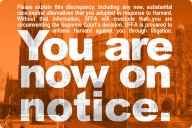You have /5 articles left.
Sign up for a free account or log in.
Interfaces are sites of power and we can claim some of that power for ourselves.
--Tim Sherratt
Sometimes I worry that libraries that try to create alternatives to big publishing are just adding more publications to the already bloated number of scholarly journals being published. I worry that well-intentioned alternatives too often end up filling a niche that may be valuable, but doesn’t do anything significant to change the way we share knowledge. I wonder if we’re just adding new tasks to our workload while continuing to feel an obligation to spend our resources in ways that are quite clearly against our own interests. Back in October I wrote about how helpless I felt when two major academic publishers, SAGE and the American Chemical Society, jacked up our subscription prices by 25% and 22% overnight. We were lured in by discounts, and now they have us over a barrel, and they know it. Besides, we’re small; if we canceled these subscriptions, it wouldn’t matter to them. It would, however, matter tremendously to our community.
It’s hard to fight back when the power is so unequally distributed. So I get discouraged – until I read about someone doing something new and really cool and doing it for no other reason than that it fills in gaps in our knowledge. Technology and open sharing enable the kind of projects that Clay Shirky described in his book, Here Comes Everybody: “We are used to a world where little things happen for love and big things happen for money. Love motivates people to bake a cake and money motivates people to make an encyclopedia. Now, though, we can do big things for love.”
Scholarship is a big thing and most of us do it for love; the piece we forget is how important it is to share it.
Tim Sherratt, an Australian digital historian, has just written about an amazing project he has been working on. He is helping rewrite the history of Chinese Australians and, by extension, the history of what it means to be Australian, by using facial recognition technology to scan through photographs at the National Archives of Australia and extract relevant metadata to tell history differently. This task is part of a broader effort to pull together information from a variety of sources to tell the story of Invisible Australians. In a sense he’s reverse-engineering the bureaucracy that once determined who was a proper Australian and is using the record-keeping used to control and oppress people to restore their history. He’s also taking what cultural institutions do – preserve, sort, interpret, and present culture – and reorganizing it using different rules. His search is guided by his questions, not by the categories the cultural institution uses (though the National Archives is supportive of his work). It’s an exhilarating demonstration of what can happen with open data and an open mind. He writes:
“These are all projects about finding people. Finding the oppressed, the vulnerable, the displaced, the marginalized and the poor and giving them their place in history ...
‘Invisible Australians’ aims to extract more than just photographs. We want to record and aggregate the biographical data contained within the records of the White Australia Policy — to extract the data and rebuild identities.
“But we want to do more, we want to link these identities up with with other records, with the research of family and local historians, with cemetery registers and family trees, with newspaper articles and databases we don’t even know about yet. We want to find people, families and communities.
“It’s ridiculously ambitious and totally unfunded. But it is possible.”
When I grow discouraged about all the knowledge that is going under lock and key, at the processes that lead us to keep doing things the way we’ve always done them, only on a more massive scale costing far more money, when I wonder whether we’ll ever break out of this unsustainable and irrational situation, a project like this comes along. One so smart and creative and daring that it proves to me we don’t need giant corporations and fat budgets to do lovely big things. One that is taking information that's already available and reassembling it in new, liberating ways.
We could reclaim our own research by recognizing the interface—the one owned by SAGE or Elsevier or Wiley or any of a number of corporations—is a site of power. When we voluntarily donate knowledge to corporations to be hidden from those who can’t pay for it, we are giving up power we could use for better things. It’s our choice.





